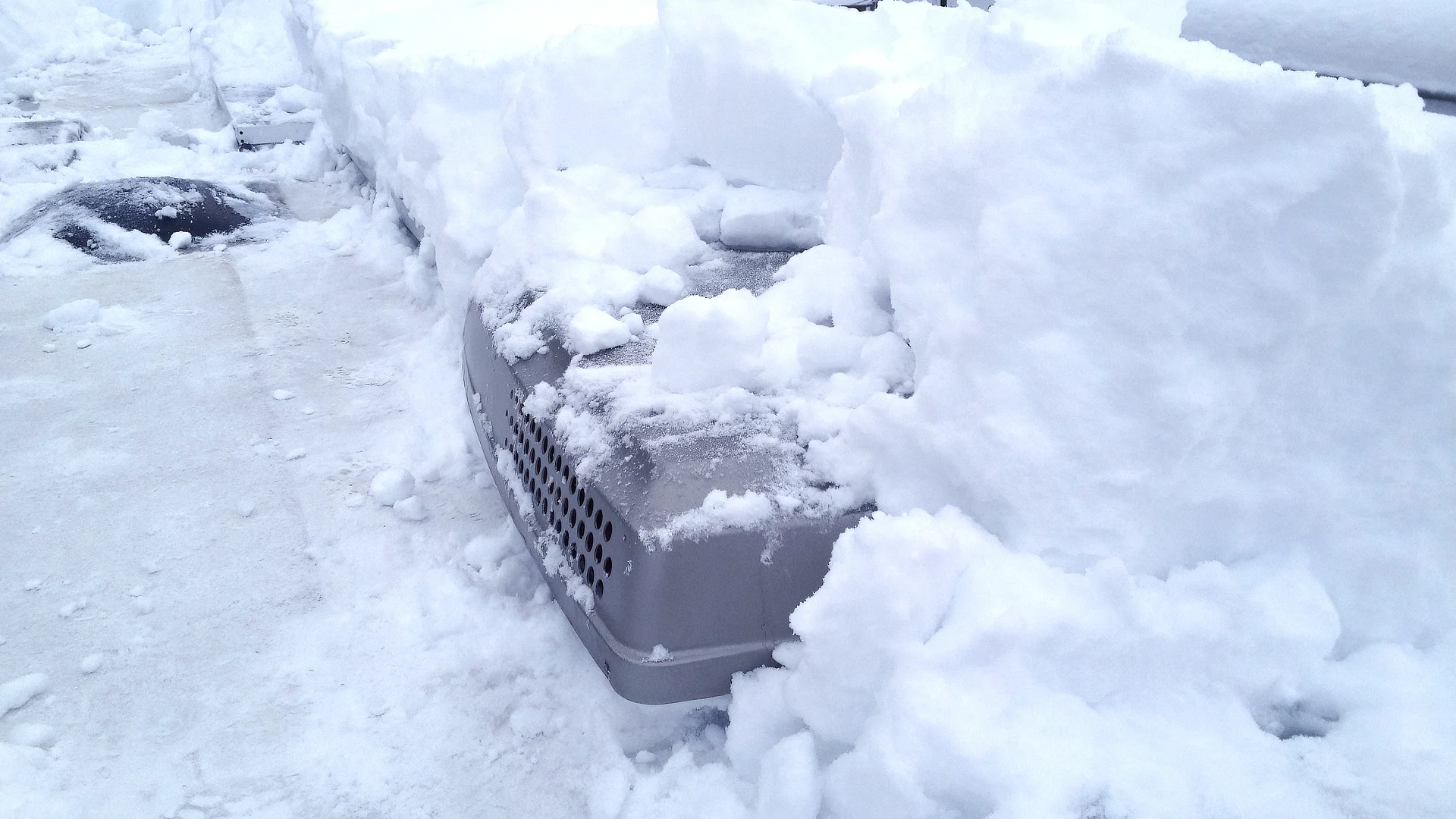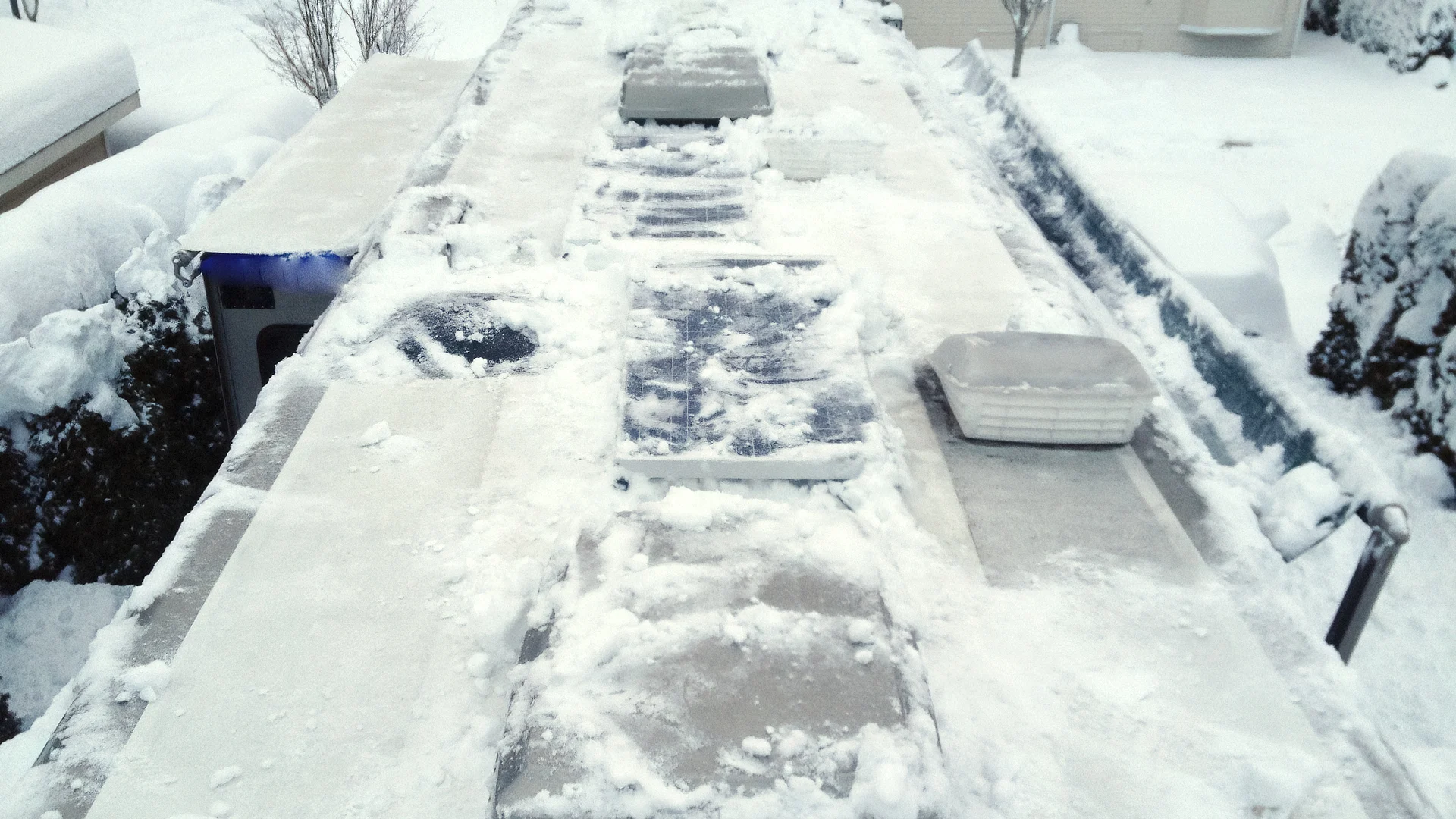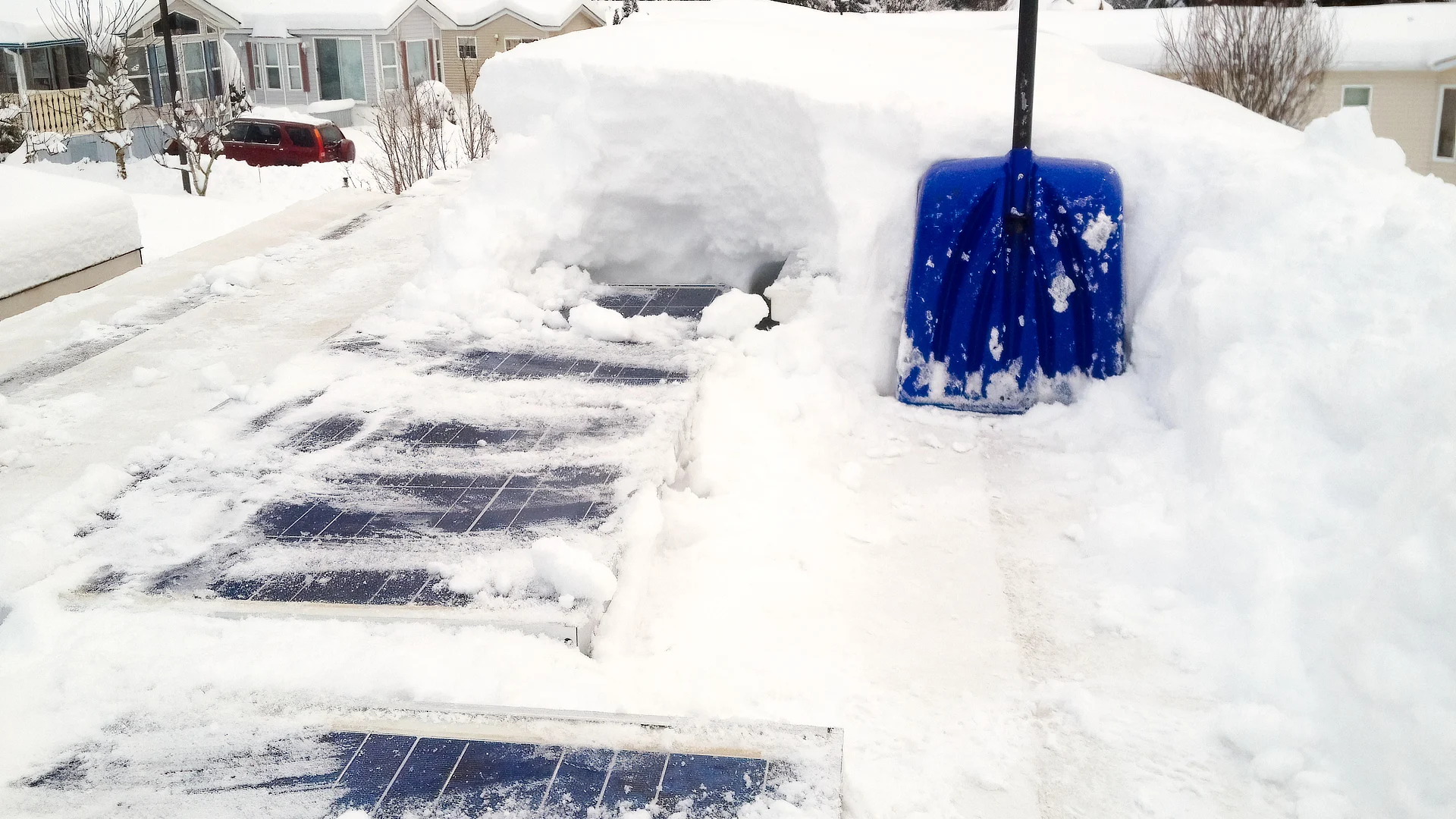We live full-time in our RV and we have for about 18 years now, so RV covers haven’t been on our list of things to research. But as we’ve been thinking of our fellow RVers who are preparing to store their rigs for the winter, a question arose about covering RVs that don’t have the opportunity to hibernate at an indoor storage facility. So, today we’re investigating the pros and cons of RV covers.
Let’s get right to it!
What is an RV Cover?
RV covers were made for RV owners who don’t have a place to store their under a solid roof when not in use but who want to protect them from the elements. RV covers offer protection that doesn’t require a large garage or the cost of a storage facility.

RV rooftop appliances, such as our rooftop AC unit shown here, are protected from the elements when an appropriate RV cover is used.
Made of strong, durable, water-resistant fabric (such as polypropylene or polyester), RV covers protect the paint and finish of the RV as well as windows and rooftop appliances (such as air conditioners and vent fans) from UV rays, rain, snow, ice, hail and even debris like small tree branches.
Is Covering Your RV a Good Idea?
The answer to this question depends on what you’re using to cover your RV. Covering your RV is a good idea if you’re using a high-quality cover made of breathable material (like polypropylene or polyester), particularly one that has vents that allow a bit of airflow under the cover, and a water-resistant coating.
In order to prevent mold and mildew (both to your RV and to the cover itself), a high-quality cover is designed to allow trapped moisture to evaporate and is also designed for the cover to dry quickly and completely. So, breathable cover materials and vents allow moisture to escape, thus prohibiting the growth of mold and mildew which can cause damage to your RV and the cover.
In addition, vents can be helpful in strong wind conditions that might otherwise cause a fair amount of stress to the fabric and tie-down straps.
What is NOT good to do is to cover your RV with something that isn’t specifically designed for this purpose.
What Are the Pros of Using an RV Cover?
There are pros and cons of RV covers, but the benefits can surely outweigh the disadvantages, providing you’re using a high-quality RV cover.
Whether you’re storing your RV in a cold winter climate or in a warmer location, protection from UV rays is a benefit of a high-quality RV cover. The sun can damage seals, fade decals, and even degrade your RV’s paint.
Keeping moisture off of (and thus out of) your RV is another important factor in the “pro” category of the “pros and cons of RV covers”. Moisture and leaks are enemies of every RV, and anything that adequately protects your RV from potential water damage is a clear benefit.

If your RV is stored in areas that are prone to snowy conditions, an RV cover can be helpful, as long as it’s a high quality cover designed for this purpose. With or without a cover, you’ll need to keep heavy snow from accumulating on your RV’s roof!
General protection from every type of weather is another advantage of RV covers. Whether the area where your RV sits sees lots of sun, rain, snow, ice, or wind, a high-quality RV cover will offer a degree of protection that an uncovered RV wouldn’t receive.
And finally, an RV that remains outside in any season and in any type of weather will require a serious wash and a wax job at the very least, or an expensive detailing job depending on where (and how long) it’s sitting while it’s not in use. A good RV cover (properly installed) will protect your rig from dirt, debris, small tree branches, sap/pitch from trees, and the ire of defecating birds.
What Are the Cons of Using an RV Cover?
On the “cons” side of the equation, in windy conditions (especially in areas that are consistently windy), the blowing and rubbing of the material against the finish of an RV for months at a time can cause the finish to dull or even to sustain small scratches or worse. If storing your RV in conditions like this, be sure to regularly check that the cover is properly tied down and not unduly flapping/chafing due to the wind.
Also, if your RV cover isn’t made of the appropriate material, or if it doesn’t fit correctly or is poorly attached and secured, airflow can be too great or insufficient, and that could result in the breeding of mold and/or mildew.
As well, generators and engines need to be run periodically (even when stored!) and, depending on the type of RV you have & the type of RV cover you’re using, running the engine and/or the generator might be difficult without removing the cover. In this case, you’ll either be highly inconvenienced by the need to remove the cover periodically, or you’ll choose not to exercise your generator or engine. Depending on how long a period of time your RV remains covered and unused, this could be a problem.
Should You Cover Your RV in Winter?
If you don’t intend to use your RV in winter, covering it is a good idea as long as you cover it properly, using a high-quality cover that fits your RV appropriately.
And again, if you’re able to exercise your generator and your RV’s engine periodically, and if you’re able to enter your RV occasionally to check for unwanted guests of the rodent variety, covering your RV in winter should work well for you.
Bear in mind that if you live in high-snow areas, allowing a lot of snow to sit on your RV all winter is not a good idea. First, the weight of the snow itself can do damage to the various covers and components on your roof, or even the roof itself! Second, snow melt can pool up underneath the snow and find ways into your RV that it normally wouldn’t, doing unseen damage that could haunt you for years to come.
So it’s a good idea to remove snow as it occurs in order to prevent a significant accumulation of heavy snow and ice.

Here you see our RV after a snowstorm that brought a very significant accumulation of snow to our rooftop. RV cover or not, heavy snow must be removed from the roof of your RV. Here we had to use extreme caution as an uncovered, snowy RV roof is extraordinarily slippery.
Should You Cover Your RV with a Tarp?
No. Never. Not in any universe should you ever cover your RV with a tarp for an extended period of time. Tarps are not constructed of breathable material, which is why covering anything with a tarp for a long period of time is a sure-fire way to find mold and mildew breeding when you remove it.
If you’re going to cover your RV at all, try to locate a well-made RV cover that will offer protection to your rig rather than making it more vulnerable than keeping it uncovered would.
Pros and Cons of RV Covers at a Glance
An RV is a significant investment and certainly worthy of as much protection as we can offer. When your RV won’t be in use for an extended period of time, if you’re unable to store it under a roof either at your home or at a storage facility (which can be quite expensive), a good RV cover may be well worth owning.
It’s obviously important, however, to make sure that the cover is not only of high quality but also adequately secured so that no damage will come to the RV as a result of being covered.
If a high-quality RV cover is not affordable or obtainable at this time, your RV might be best left uncovered, with close monitoring and good care and maintenance throughout the period of unuse.
Geek Out with Us Every Week
Join our newsletter to learn about all things RV-related. Every week we offer free tips, tricks, product reviews, and more to our online community of RVers. So, whether this is your first time on the road or you’re a seasoned expert, we’d love for you to geek out with us!


Dan Mandle
Friday 25th of August 2023
What about if I’m storing my camper indoors over the winter. Does the cover provide extra protection from dust, rodents, etc.? Worth it?
TheRVgeeks
Tuesday 29th of August 2023
With indoor storage, we'd probably skip buying/using a cover, Dan. Unless your storage place is particularly dusty, and you want the RV to be more spic-and-span clean come spring, a cover's not going to do you much good.
John Schretlen
Saturday 27th of November 2021
One of the most amazing RV-related sights I've ever seen is the acres and acres of RVs stored in and around Elkhart, IN while they await delivery. Not a covered storage or RV cover in sight.
When I think of RV covers I always think of that sight knowing storage time outdoors and the winters in Elkhart are not like the winters in the desert south-west.
I think this is your first post on a topic without ANY links to purchase. Turning over a new cover?
John Schretlen
Sunday 5th of December 2021
My question was answered on December 5th, 2021.
Michael Sawicki
Saturday 27th of November 2021
I don't use a cover for our 5th wheel that is stored outside all winter in WNY. I found it much too dangerous to remove when snow and ice are on the cover, as it usually is in February when we hitch up to head south. If there was a safe way to remove it, I would use a cover.
TheRVgeeks
Saturday 27th of November 2021
That is a tough one, Michael. Wanting to take your RV out of storage mid-winter like that is definitely a challenge. If we think of any ideas for how to get the cover off with snow & ice on it, we'll let ya know. Or, maybe someone else on here will have an idea that worked for them?